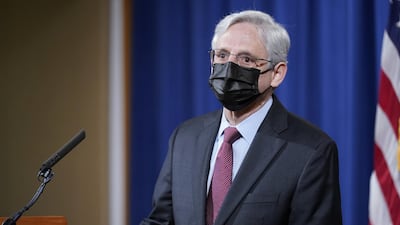The US Justice Department is opening a sweeping investigation into policing practices in Minneapolis after a former officer was convicted in the killing of George Floyd there, the country's attorney general, Merrick Garland, said on Wednesday.
The decision comes a day after fired officer Derek Chauvin was found guilty of murder and manslaughter in Floyd's death last May, setting off a wave of relief across the country.
The death prompted months of mass protests against policing and the treatment of black people in the US.
The Justice Department was already investigating whether Chauvin and the other officers involved in Floyd’s death violated his civil rights.
“Yesterday’s verdict in the state criminal trial does not address potentially systemic policing issues in Minneapolis,” Mr Garland said.
The new investigation is known as a “pattern or practice” – examining whether there is a pattern or practice of unconstitutional or unlawful policing – and will be a more sweeping probe of the entire police department and may result in major changes to policing there.
It will examine the use of force by police officers, including force used during protests, and whether the department engages in discriminatory practices.
It will also look into the department’s handling of misconduct allegations and its treatment of people with behavioural health issues and will assess the department’s current systems of accountability, Mr Garland said.
Mr Garland said a public report would be issued, if the department finds a pattern or practice of unconstitutional policing.
The Justice Department could also bring a lawsuit against the police department, which in the past have typically ended in settlement agreements or consent decrees to force changes.
Floyd, 46, was arrested on suspicion of passing a counterfeit $20 note for a packet of cigarettes at a corner market. He panicked, pleaded that he was claustrophobic and struggled with police when they tried to put him in a squad car. They put him on the ground instead.
The Minneapolis Police Department is also being investigated by the Minnesota Department of Human Rights, which is looking into the department’s policies and practices over the last decade to see if it engaged in systemic discriminatory practices.

























